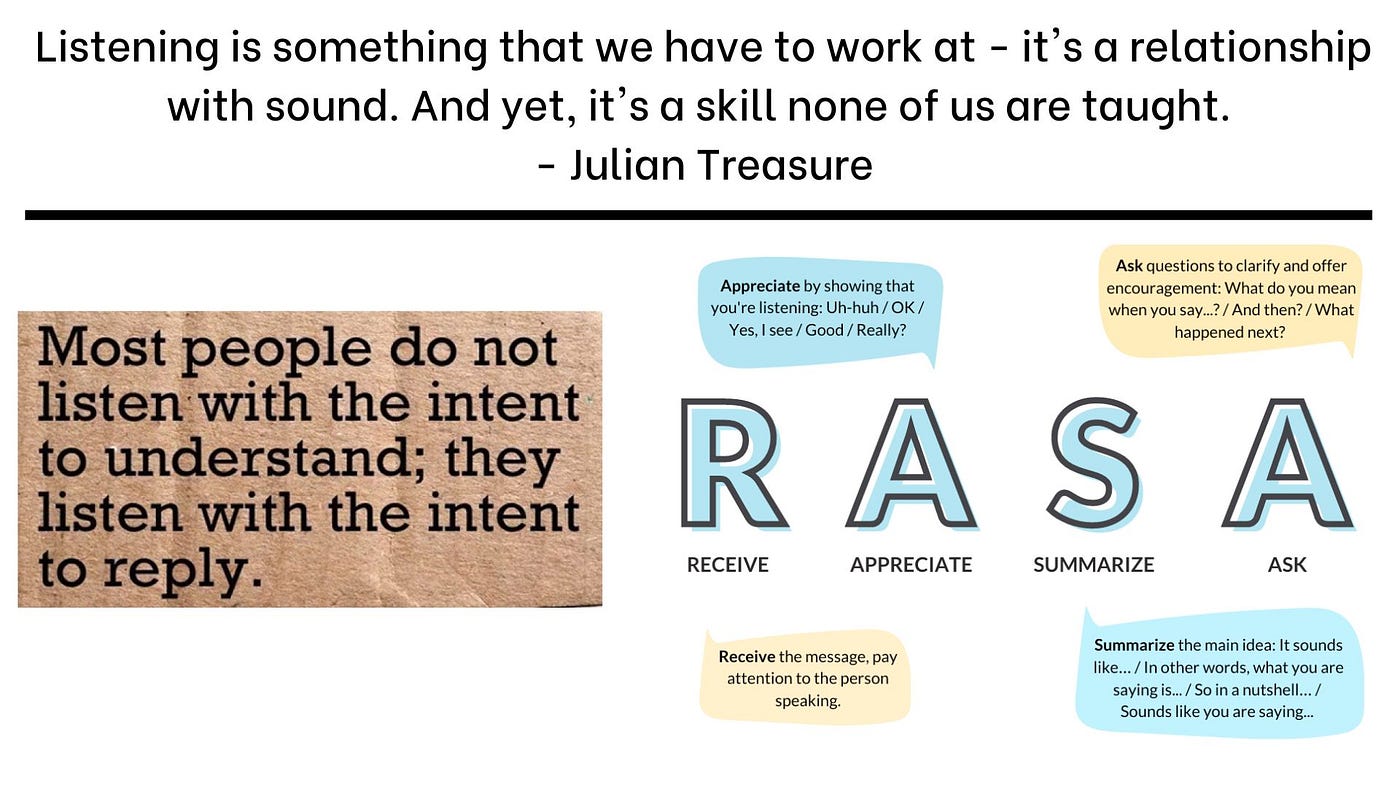ALDE Course, Week 3: Building Connections
“You cannot truly listen to anyone and do anything else at the same time.”
― M. Scott Peck
Crowds make me dizzy with anxiety. As a hard core introvert, I’ve learned to be extroverted for work, but whenever I’m “networking” in large, impersonal spaces, I feel like I’m just one bee in the swarm.
I’ve found out I’m far from alone. When my students share their networking exhaustion, I introduce them to an approach I like to think of as “networking for introverts”: the art of building meaningful connections that can endure beyond the transactional. In other words, a relationship where you’re not just trying to get something from each other.

Authentic Relationships Require Active Listening
The only way I can connect authentically with other humans is to listen to one person at a time. This is one area where my training as an academic has helped me. Critical analysis of a text isn’t so unlike listening actively with an intent to understand another person’s story.
In his book Four Thousand Weeks: Time Management for Mortals, Oliver Burkeman argues that every worthy task deserves your close, selective attention:
“your experience of being alive consists of nothing other than the sum of everything to which you pay attention.”
Whether in a job interview, at work, or in life, people can sense your inattention. It never feels good. But when you practice active listening, every conversation becomes an opportunity to connect with the human being in front of you, which benefits you more than zoning out to mentally prepare your response. This is what “networking for introverts” is all about.
In Week 3 of the Alumni Life Design Experience (ALDE),* we focused on building authentic connections with alumni by asking for help in ways that are clear, concise, and relevant to what you need. After sharing some highlights from Week 2, we covered the nuts and bolts of asking open-ended questions and listening actively and with curiosity to the answers.
Curiosity is a practice of enlightened self-interest. When you ask the right kinds of questions, people will like you more, and when people like you, they’re more willing to help you. That’s how authentic connections begin: asking thoughtful questions and listening to understand the responses.
How Might I take Active Listening Further
In our third week together, ALDE participants framed their needs and interests in the form of “How Might I” statements, ideating diverse ways to build a network of core, direct, and indirect stakeholders. Doing so nudged them outside their familiar flock to gain new insight from people with different perspectives and experiences than themselves.

For example, if someone wants to pivot within the environmental field, the questions might look like this: “How Might I: (1) Find someone who specializes in environmental issues and uses collaborative problem-solving, which is something I discovered in my three possible lives (2) Collect information from individuals in this field working at the federal, state, and local levels, and (2) Create experiences in this field by shadowing the person I spoke with or attending a virtual meeting with diverse stakeholders?
Authentic connections are crucial to your long-term success, but that doesn’t make it easy to take that first step: writing an email. To encourage students to find mentors, we placed them in small groups to co-create an email using JHU’s OneHop platform to find an alum connected to their goals.

After co-creating a script they felt confident about sending, we turned to the skills needed and questions to ask in the setting of an informational interview. One important skill that is often overlooked in interviews is the ability to listen actively and with empathy.
How can empathy help us become better job candidates?
Listening and communication expert Julian Treasure believes we can absolutely improve our ability to listen — deliberately and empathetically. He uses the acronym RASA, an Indian concept meaning the essence or aesthetic flavor of something. To listen with empathy, Treasure explains, you need to be able to Receive, Appreciate, Summarize, and Ask Questions. This means becoming aware of the filters and positions from which we hear another person. Listening, he argues, is our access to understanding, a way to make meaning out of sound. And yet, even though we were taught to read and write, we aren’t taught to listen.

Week 3 of ALDE was all about finding people whose experiences can help you navigate your professional journey and what to say to them to ensure they remember and want to help you in the future. In a single conversation, they gathered resources and suggestions for additional people who could help them learn about a new role or industry. They expressed confidence and excitement about curating their network one person at a time.
In Week 4, our final week together, we put the tools and mindsets of our course together to begin crafting our stories in tailored resumes and cover letters. Participants started taking tangible steps to continue our exploration of new fields and professional experiences.
*Alumni Life Design Experience (ALDE) is a collaborative effort among Johns Hopkins Alumni Association/ Lifelong Learning, OneHop Mentoring, and the Imagine Center, led by Farouk Dey, Vice Provost of Integrative Learning and Life Design. Our team of experts (Heather Braun, Brian Davis, Michael Gonzales, Casey Miller, Janine Tucker) specializes in mentorship, development, alumni relations, and life design. ALDE’s mission is to connect Hopkins alum from around the world seeking to make personal and professional changes by giving them tools for getting unstuck and moving forward despite uncertainty.

